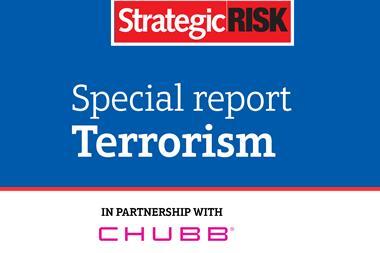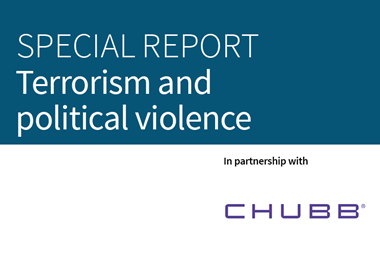It’s unlikely that European authorities will beat the jihadists any time soon

The terrorists who killed 32 in the attack in Brussels in March were inspired by a slogan – “media is half of jihad” – that sets the stage for future European atrocities. The implications for businesses are important, especially those close to popular locations. In practical terms, the slogan reflects a focus on headline-making, set piece-style invasions of high-profile places that attract large numbers of people.
“Headlines help bring in recruits,” explains Risk Management Solutions’ authority on European terrorism, Dr Gordon Woo. “They get a lot more attention when people are killed.”
Thus, as we’re seeing with the escalation of cyber attacks on bigger and bigger organisations, experts say future terrorism targets are likely to be relatively open spaces in capital cities – those where tourists and locals routinely gather, but that are difficult to protect against heavily armed attackers prepared to die in the process.
These predictions are based on the most recent attacks. In last November’s armed incursions in Paris, the terrorists selected the Carillon bar (15 dead), the Comptoir Voltaire café (suicide-bombed by the brother of mastermind Salah Abdeslam, with several severely wounded), the Bataclan nightclub (89 dead), and the Stade de France (struck by three suicide bombers). Similarly, the bombings on March 22 of Brussels airport and Maalbeek metro station targeted areas that are usually thronged with people.
All of these locations are classified as soft targets vulnerable to clandestine terrorism organisations. “It’s clear there are more networks out there,” warns Jonathan Wood, director of global risk analysis at Control Risk. “There’s a certain irreducible level of threat. It’s never going to be possible to prevent and detect all of these threats. And we’re seeing a move towards larger-scale, more complicated attacks.”
Unfortunately, nobody is ruling out further ‘lone wolf’ attacks of the kind that left 12 people dead at the Paris offices of satirical magazine Charlie Hebdo in January 2015. According to Alain Chouet, former head of security intelligence at the DGSE (the French equivalent of the CIA), killers Chérif and SaÏd Kouachi were petty criminals who, having been recruited by al Qaeda in Yemen, acted on their own initiative without any instruction.
Hornets’ nest
The fight against terrorism has long been hindered by gaping holes in the exchange of terrorism-related information between EU countries – indeed, even within countries such as Belgium. For example, Philippe Moureaux – former long-serving mayor of Molenbeek, the suburb in Brussels that was dubbed Europe’s ‘terrorist factory’ – consistently denied problems were brewing there for fear of giving it a bad name and, he said, arousing ethnic tensions. Responding to complaints about the continual harassment of Jewish residents by Muslim activists, he once said: “It makes me angry when people pick out tiny details and lie about them. Molenbeek is not the Bronx.”
No, it was far worse. During the 20-year Moureaux mayoralty, which ended in 2012, the suburb steadily turned into what Woo describes as a “hornets’ nest” of terrorism. The Paris and Brussels attacks were planned from Molenbeek.
Successive Belgian governments have buried their heads in the sand. The latest atrocities were carried out mainly by ‘cleanskins’, in intelligence terminology. That is, people who do not have a track record in crime or terrorism and who can be uncovered only by elaborate surveillance systems that trample over the privacy issues that have long preoccupied the EU capital and European MPs. “In Belgium there’s been a mistrust of the intelligence services,” points out Woo.
Certainly, for all its vaunted philosophy of mutual co-operation, the EU has lagged far behind its Western counterparts in dealing with terrorism and has a lot to learn – in a hurry.
Law enforcement agencies in the UK, the US, Canada, Australia and New Zealand (the so-called Five Eyes) have pooled resources to run the most effective global anti-terrorism campaign, freely sharing high-quality information that has thwarted many attacks, most of which we don’t hear about.
The EU’s foot-dragging is partly a funding issue, say experts. Compared with the US$100bn budget deployed by the Western anti-terrorist organisations, the EU’s anti-terrorism finances are seen as inadequate and poorly targeted. But the main reason is said to be the fragmented, domestically focused nature of EU member states’ law enforcement organisations, which makes them ill-equipped for transnational co-operation.
There are also concerns about leaks. “UK anti-terrorism agencies simply do not trust [law enforcement] counterparties in some EU states,” explains Woo.
New measures
On the bright side, Europe is waking up faster to the threat of random urban terrorism. Shocked into action by the most recent attacks, France is deploying new measures to combat the scourge, such as putting more forces on the ground. The number of soldiers and police on the streets of Paris and at iconic monuments such as the Louvre has increased considerably.
And information-sharing deficiencies are being addressed. Since the Paris attacks, MI6 and the CIA have started passing on intelligence to Belgium – it’s believed that the arrest in Molenbeek of Salah Abdeslam, regarded as the mastermind behind December’s atrocities in Paris, was the direct result of information supplied by British and American counter-terrorism.
In late April, Europe joined forces with the UK’s Counter Terrorism Internet Referral Unit to crack down on terrorist and extremist propaganda that has been freely propagated through social media channels. Simultaneously, Europol’s power to arrest suspects has been strengthened, albeit after years of effort.
Some mooted initiatives are seen as impractical, such as the call by Belgium prime minister Charles Michel in the wake of the Brussels atrocities for an EU-wide CIA. “It will never happen,” says one source.
But can the war be won? As Control Risk’s Wood explains, this is unlikely without much closer co-operation with Algeria, Turkey and Libya, so often the channel for terrorists. And as long as illegal migrants can slip into southern Europe through the largely unpoliced routes out of Libya and Tunisia, terrorist cells will have a ready supply of recruits.
It’s encouraging that France at least is determined not to be cowed and to go on with life.
The Comptoir Voltaire and Carillon have reopened, courtesy of a hefty grant from the Mayor of Paris, and its former customers are back. And under its own slogan – “Nuit Debout” meaning literally ‘up all night’ – thousands have been gathering after dark at the Place de la République in a show of solidarity against the terrorists.
Tips for risk managers
- Should an attack take place nearby, have procedures in place that lock the business down as quickly as possible. Businesses with small frontages, such as office blocks, can be shut down fast.
- Know where your road warriors are at all times, especially in high-risk countries and regions.
- Update the annual – or preferably more frequent – emergency exercises to reflect the latest kinds of threats.
- Develop a business continuity manual whereby staff are enabled to work from home or other secure locations until it’s safe to return.
- Above all, if the business does suffer an attack, have a system for getting it up and running as soon as possible. “It’s good for the business and good for the country,” says Risk Management Solutions’ Gordon Woo.




















No comments yet